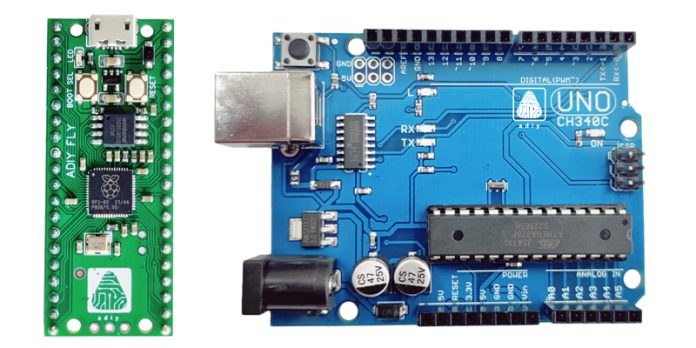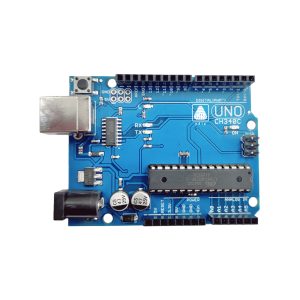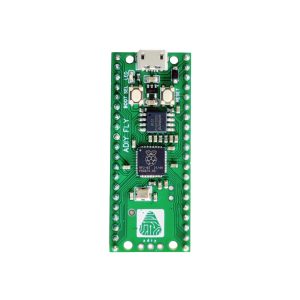ADIY UNO is a microcontroller board based on the ATmega328P. Instead of ATmega16U2 processor, it is assembled with CH340C IC. t has 14 digital input/output pins (of which 6 can be used as PWM outputs), 6 analog inputs, a 16 MHz ceramic resonator, a USB connection, a power jack, an ICSP header and a reset button. It contains everything needed to support the microcontroller; simply connect it to a computer with a USB cable or power it with an AC-to-DC adapter or battery to get started.
Features and Specifications:
- USB-Serial IC: CH340C
- USB connector: USB-B
- Pins:
- Built-in LED Pin: 13
- Digital I/O Pins: 14
- Analog input pins: 6
- PWM pins: 6
- Communication:
- UART: Yes
- I2C: yes
- SPI: Yes
- Power:
- I/O Voltage: 5V
- DC Jack input: 9V
- DC Current per I/O Pin: 40 mA
- Clock speed:
- Main Processor: ATmega328P 16 MHz
- Memory:
- ATmega328P: 2KB SRAM, 32KB FLASH, 1KB EEPROM
- Dimensions:
- Width: 53.34 mm
- Length: 68.58 mm
ADIY FLY Pico RP2040 is the debut microcontroller-class board from ADIY
ADIY FLY comes with a large on-chip memory, symmetric dual-core processor complex, deterministic bus fabric, and rich peripheral set augmented with a unique Programmable I/O (PIO) subsystem, RP2040 provides professional users with unrivalled power and flexibility. ADIY FLY pairs RP2040 with 4MB of Flash memory, and a power supply chip supporting input voltages from 1.8-5.5V. It provides 27 GPIO pins, three of which can function as analogue inputs, on 0.1”-pitch through-hole pads. The RESET button on ADIY FLY makes the usage of module easy.
RP2040 is manufactured on a modern 40nm process node, delivering high performance, low dynamic power consumption, and low leakage, with a variety of low-power modes to support extended-duration operation on battery power.
Specifications:
- Form factor: 21 mm × 51 mm
- CPU: Dual-core Arm Cortex-M0+ @ 133MHz
- Memory: 264KB on-chip SRAM; 4MB on-board Flash
- Interfacing: 27 GPIO pins of which 4 are analog pins
- Reset button: Included
- Peripherals: 2 × UART, 2 × SPI controllers,
- 2 × I2C controllers, 16 × PWM channels,
- 1 × USB 1.1 controller and PHY,
- with host and Device support,
8 × PIO state machines.










